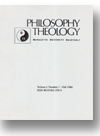|
articles |
|
1.
|
Philosophy and Theology:
Volume >
3 >
Issue: 2
Wilfried Ver Eecke
American Capitalism:
A Philosophical Reflection
abstract |
view |
rights & permissions
| cited by
The first part of this study is a reflection on the writings of Lowi and Briefs, and deals with the transition from the ideal of liberty to interest-group liberalism in the United States. In the second part I offer an analysis of Hegel’s attempt to combine the ideals of justice and liberty within a political economy. The third part deals with further issues of economic justice raised by the Bishops’ recent Pastoral Letter.
|
|
|
|
|
2.
|
Philosophy and Theology:
Volume >
3 >
Issue: 2
Steven G. Smith
Trying and Getting Credit
abstract |
view |
rights & permissions
| cited by
Trying, a central human concern, is actualized and beheld in rather pure form in athletic endeavor, where successful trying interests us as a revelation of a waxing kind of human being, full of promise. In the moral life trying is not so openly displayed, yet one’s standing in the moral system of evaluation is determined by it. The honor attaching to athletic success models the moral community’s confirmation of individuals’ commitment to it.
|
|
|
|
|
3.
|
Philosophy and Theology:
Volume >
3 >
Issue: 2
Richard Viladesau
Natural Theology and Aesthetics:
An Approach to the Existence of God from the Beautiful?
abstract |
view |
rights & permissions
| cited by
FoIlowing an historical oveview of problems which have affected an aesthetic account of God, I examine several contemporary approaches (including that of J.-D. Robert), and conclude with a cautious defense or the use or aesthetic judgement as a means or approaching the existence of God.
|
|
|
|
|
4.
|
Philosophy and Theology:
Volume >
3 >
Issue: 2
Johannes Brosseder
Möhler’s Romantic Idea of the Church:
Its Problems in the Present
abstract |
view |
rights & permissions
| cited by
Following brief accounts of Möhler’s version of dialectic and his influence upon Vatican II, I argue that much of his ecclesiology is based upon a concept of “essence” derived from romanticism. I conclude that current theology must return to some basic questions posed by the Reformation.
|
|
|
|
|
5.
|
Philosophy and Theology:
Volume >
3 >
Issue: 2
Patrick J. Coffey
Humanae Vitae and Licit Contraception?
abstract |
view |
rights & permissions
| cited by
This paper critiques John Noonan’s recent attempt to show the compatibility of Humanae Vitae and contraception. Although Noonan’s arguments are rejected, an alternate approach for showing that sort of compatibility is explored.
|
|
|
|
|
6.
|
Philosophy and Theology:
Volume >
3 >
Issue: 2
David A. Duquette
From Disciple to Antagonist:
Feuerbach’s Critique of Hegel
abstract |
view |
rights & permissions
| cited by
The basic argument of this paper is that Feuerbach’s “materialist critique” of Hegel’s speculative philosophy was misguided, and that the source of some of Feuerbach’s confusions about Hegel lie in the former’s early discipleship of the latter. In particular, I examine certain purported Hegelian themes in Feuerbach’s critique of Hegel and argue that they are distortions of Hegel’s views. Next I explore two stages in Feuerbach’s critique of Hegel, the first dealing largely with the issue of presuppositions and starting points in philosophy, and the second concerning the transformative method by which Feuerbach “inverts” Hegel’s philosophy. In the first case I argue that Feuerbach’s critique of Hegel is really only a self-critique, and in the second that his subject-predicate analysis of the relation of thought and being is incoherent. Finally, I offer an interpretation of Hegel’s speculative logic which views it as non-mystifying.
|
|
|
|
|
7.
|
Philosophy and Theology:
Volume >
3 >
Issue: 2
Andrew Tallon
Editor’s Page
view |
rights & permissions
| cited by
|
|
|
|
